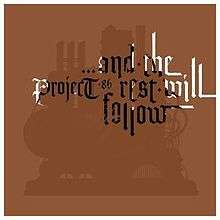...And the Rest Will Follow
...And the Rest Will Follow is the fifth studio album by American rock band, Project 86, released on September 27, 2005 by Tooth & Nail Records.
| ...And the Rest Will Follow | ||||
|---|---|---|---|---|
 | ||||
| Studio album by | ||||
| Released | September 27, 2005 | |||
| Recorded | 2005 | |||
| Studio | "The Armory, The Farm, and The Warehouse" (Vancouver, British Columbia) | |||
| Genre | Post-hardcore, alternative metal | |||
| Length | 48:53 | |||
| Label | Tooth & Nail | |||
| Producer | Ben Kaplan, Garth Richardson | |||
| Project 86 chronology | ||||
| ||||
| Review scores | |
|---|---|
| Source | Rating |
| AllMusic | |
| CCM | positive [2] |
| Christianity Today | |
| Cross Rhythms | |
| Jesus Freak Hideout | |
Track listing
All tracks are written by Project 86.
| No. | Title | Length |
|---|---|---|
| 1. | "Sincerely, Ichabod" | 4:22 |
| 2. | "All of Me" | 3:59 |
| 3. | "Doomsday Stomp" | 3:52 |
| 4. | "Something We Can't Be" | 4:16 |
| 5. | "Subject to Change" | 4:31 |
| 6. | "Necktie Remedy" | 5:13 |
| 7. | "My Will Be a Dead Man" | 4:35 |
| 8. | "From December" | 4:48 |
| 9. | "The Hand, the Furnace, the Straight Face" | 3:15 |
| 10. | "...And the Rest Will Follow" | 2:17 |
| 11. | "Cavity King" | 3:30 |
| 12. | "Wordsmith Legacy" | 4:10 |
Personnel
- Alex Albert – drums
- Ben Kaplan – programming, producer, engineer
- Kelly Kerr – photography
- Dean Maher – engineer
- Project 86 – producer
- Andrew Schwab – vocals
- Randy Torres – guitar, keyboards, programming, vocals
- Steven Dail – bass
- Josh Wilbur – mixing
gollark: Oh, we entirely forgot https://obspogon.neocities.org/.
gollark: We're provably optimal.
gollark: I know, right?
gollark: 5.4, inevitably.
gollark: It was to be highly rustaceous, and good.
References
This article is issued from Wikipedia. The text is licensed under Creative Commons - Attribution - Sharealike. Additional terms may apply for the media files.